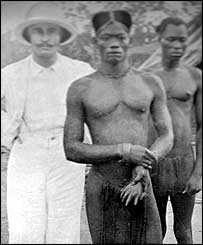
I was in Belgium earlier this year for some meetings at the European Parliament on trade between Africa and Europe. Those meetings were all about the so-called "Global Europe" program, which is code name for the European Commission's international trade strategy. (Global Europe is part of the failed EU constitution attempts and the more recent Lisbon Treaty, which might also be a failure.)
When we met with MEPs (members of the European Parliament), those who supported the Lisbon Treaty and the Global Europe proposals were quite happy to concede that this was all about increased access to the resources and markets of developing countries. They claimed that as the U.S. was already pursuing such a strategy in Africa, and China seemed to be poised to do the same, they had little choice other than to use African resources and consumers for the benefit of European corporations.
What's left unsaid is that this is not a new strategy for Europe; in fact it is a very old strategy.
When I saw some of the monuments in Belgium, one of the most famous of which is the castle at Laeken pictured above, I could not help but think of a book I had read some years ago. As I reread the book - King Leopold's Ghost, by Adam Hochschild - over the past few weeks, I began to understand this castle and much of Europe's splendor would not have been possible without the brutality of European colonialism in Africa.
King Leopld II was the King of Belgium from 1868 until his death in 1909. While turn-of-the-century Europe was moving towards a parliamentary democracy system with Kings as figureheads rather than purveyors of political power, Leopold established a mediaeval kingdom in the heart of the tropical African jungle. Its purpose? To extract African natural resources (in this case wild rubber) for the profit of European corporations and the Belgian King. The Africans "employed" to harvest the wild labor were subject to kidnappings, forced labor, whippings using a deadly hippopotamus hide instrument called the chicote and murder. Soldiers were punished for using bullets for anything other than killing, so for every bullet spent they were encouraged to bring back a human hand to their captain. By most estimates, the toll of murder, disease, famine, and reduced birth rates cost the Congo some 10 million lives during Leopold's rule.

Leopold used the fruits of this system to build buildings in Laeken, Brussels, and elsewhere in Europe, to buy property on the French Riviera, and to keep his young mistress in the fancy silks that she preferred. When court battles after his death divided up his huge fortune between his daughters and the Belgian state, the option of returning the ill-gotten gains to the people of the Congo was not considered.
While the brutality of the Belgian Congo is not worse or better than the brutality of the French, Portugese, Dutch or English colonizers in Southern and Central Africa, there are a couple of things that stand out about this story. The first is that so few people - even in the countries involved - know about it. Stories of the rubber terror do exist in some oral traditions of some of peoples of the Congo, but for the middle and upper classes who receive their education in Kinshasa or in other cities, the Belgians are still portrayed as those who brought civilization to Central Africa. In Belgium, my references to King Leopold's Congo were usually met by completely blank stares.
The second is that by virtue of its other riches and continued European and American exploitation of those riches, the Democratic Republic of the Congo (as the former Belgian Congo is known today) is still a disaster area. At the end of the colonial period, anti-colonial elements galvanized around Patrice Lumumba, a charismatic leader who believed in African economic as well as political independence and was greatly influenced by the All-African Peoples' Conference in Accra, Ghana. CIA operations chief Richard Bissell saw Lumumba as a "mad dog", and paid mercenaries to assassinate him in 1961, about a year after he had taken office as the country's first Prime Minister. The U.S. went on to prop up the military dictatorship of Mobutu Sese Seko, a man whose habits of giving away lucrative mining contracts to whoever would pay the biggest bribe and treating the country's finances as his own bank account resembled those of Leopold II nearly a century before.
If one really wants to understand the brutality of the global economic system - either the colonial economic system or the system that has replaced it - one need look no further than the Congo. Here's a short video that touches on Leopold's rule but is primarily about Lumumba...

5 comments:
You should visit our website at www.congoweek.org to see what the congolese people in the diaspora and the world is doing to change the notion of the Congo
I'm really glad to hear that some people do indeed look upon symbols of European wealth and see the fruits of colonial exploitation. I have yet to visit Europe, but whenever friends or family have photos to show me of their travels, I find myself thinking of the ways in which such grandeur was accumulated and at whose expense.
So anyway, I enjoyed this post (if "enjoyed" is the right word), and think I'll read your blog regularly now that I have discovered it.
Good video, but I am not quite sure you can say Lumumba was being authoritarian. In order to defend freedom won at so great a cost, of course he had to bring together the armed forces and assert the power of the free country.
I just read the book Ghost of King Leopold, and am totally taken aback by the magnitude of the terror and how it was masterfully perpetrated in the name of spreading democracy and bringing God to a people. I visited Auschwitz last year was appalled at how humans did not react to such treatments of other humans. But this part of our history is far worse, as the genocide is rarely acknowledged even now and the ill effects are far from gone.
I really enjoyed your video, very informative and great images.
Post a Comment